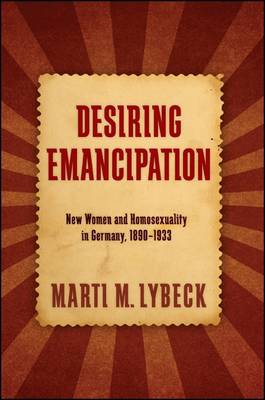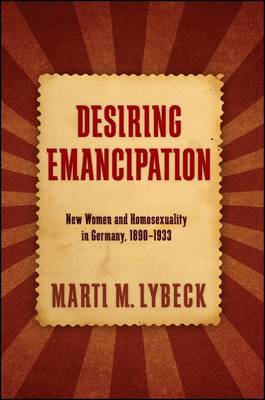
Door een staking bij bpost kan je online bestelling op dit moment iets langer onderweg zijn dan voorzien. Dringend iets nodig? Onze winkels ontvangen jou met open armen!
- Afhalen na 1 uur in een winkel met voorraad
- Gratis thuislevering in België vanaf € 30
- Ruim aanbod met 7 miljoen producten
Door een staking bij bpost kan je online bestelling op dit moment iets langer onderweg zijn dan voorzien. Dringend iets nodig? Onze winkels ontvangen jou met open armen!
- Afhalen na 1 uur in een winkel met voorraad
- Gratis thuislevering in België vanaf € 30
- Ruim aanbod met 7 miljoen producten
Zoeken
€ 46,45
+ 92 punten
Uitvoering
Omschrijving
Desiring Emancipation traces middle-class German women's claims to gender emancipation and sexual subjectivity in the pre-Nazi era. The emergence of homosexual identities and concepts in this same time frame provided the context for expression of individual struggles with self, femininity, and sex. The book asks how women used new concepts and opportunities to construct selves in relationship to family, society, state, and culture. Taking a queer approach, Desiring Emancipation's goal is not to find homosexuals in history, but to analyze how women reworked categories of gender and sex. Marti M. Lybeck interrogates their desires, demonstrating that emancipation was fraught with conflict, anachronism, and disappointment.
Each chapter is a microhistorical recreation of the actions, writings, contexts, and conflicts of specific groups of women. The topics include the experience of first-generation university students, public debates about female homosexuality, and the stories of three civil servants whose careers were ruined by workplace accusations of homosexuality. The book concludes with a debate between the women who joined the 1920s homosexual movement on the meanings of their new identities.
Each chapter is a microhistorical recreation of the actions, writings, contexts, and conflicts of specific groups of women. The topics include the experience of first-generation university students, public debates about female homosexuality, and the stories of three civil servants whose careers were ruined by workplace accusations of homosexuality. The book concludes with a debate between the women who joined the 1920s homosexual movement on the meanings of their new identities.
Specificaties
Betrokkenen
- Auteur(s):
- Uitgeverij:
Inhoud
- Aantal bladzijden:
- 300
- Taal:
- Engels
- Reeks:
Eigenschappen
- Productcode (EAN):
- 9781438452227
- Verschijningsdatum:
- 2/07/2015
- Uitvoering:
- Paperback
- Formaat:
- Trade paperback (VS)
- Afmetingen:
- 150 mm x 226 mm
- Gewicht:
- 417 g

Alleen bij Standaard Boekhandel
+ 92 punten op je klantenkaart van Standaard Boekhandel
Beoordelingen
We publiceren alleen reviews die voldoen aan de voorwaarden voor reviews. Bekijk onze voorwaarden voor reviews.











